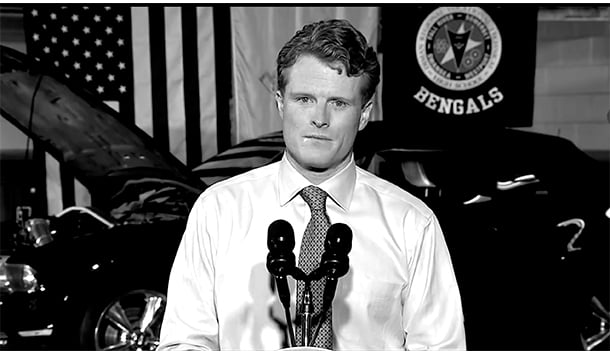Year after year, a president gives a State of the Union Address, and year after year the minority party’s response is predictably awful.
Admittedly, the quest to find a humanoid capable of speaking sensible and winsome words into a camera in a political context has always proved to be a remarkable challenge, even for the Democrats, despite that party’s glut of SAG members and monetized YouTube stars.
This year, the Democrats held forth for your consideration Joe Kennedy III, who bravely drew his silver spoon on behalf of blue-collar wage-earners, the military, and law enforcement, but also in defense of Dreamers, the transgendered, and feminist protest-marchers.
The media—particularly CNN and the Washington Post—assailed Donald Trump during the 2016 campaign for referring to a “small loan of one million dollars” given him by his father when he was starting out in the real-estate business in 1968. CNN helpfully included figures such as the median income and the median home price for that year, numbers intended to demonstrate that Trump could not possibly care about the plight of American workers.
Meanwhile, InsideGov.com, which collects data on all members of Congress, estimates the value of Joe Kennedy III’s trust fund—money he earned by being born the great-grandson of hooch entrepreneur and powermonger Joseph Kennedy—at $43.2 million, making him “one of the wealthiest members of Congress,” worth “51 times more than the average representative.” Curiously, this was left out of the media’s fête of the “rising political star,” the latest hopeful for American idol.
Kennedy’s speech demonstrates that the Democrats have learned nothing from their defeat by Donald Trump in 2016. It was yet another appeal to identity politics, an attempt at drawing middle-class Americans toward the pole of minority victimhood. Kennedy and the career politicians of the DNC are still betting that American workers and taxpayers will identify with the terminally oppressed, even as they scold those same Americans for being oppressors. Which Trump voter in a swing state will be swayed by being told that his vote was the result of Russia being “knee-deep in our democracy,” as the blindingly white-faced Harvard Law graduate put it? Which factory employee or financial planner, who doesn’t spend his days on Twitter, will believe that Trump’s “Justice Department [is] rolling back civil rights by the day”? Which citizen, with his new tax cut soon to be in hand, will agree that Trump is merely enriching the wealthy, and not giving “workers their fair share of the reward”?
Kennedy claims he will not seek the presidential nomination in 2020. He’s pledged his fealty to embittered feminist and self-identified trans-Native American Elizabeth Warren, his old professor. But the earnest young scion of Camelot is not entirely wet behind the ears. He admits that he would join the 2020 ticket “if I can sail in as Oprah’s VP.”
This possibility is not nearly as far-fetched—or unworkable—as Republicans would like to believe. Conservatives tend to impute their own feelings of disgust to the vast American electorate, assuming most voters are like them and think as they do. Even Trumpists tend to stay within their own echo chambers. They forget that Barack Obama won two elections in recent memory. They forget that Obama touted a kind of populism, appealing to the vast American middle that was worried about a financial crisis that resulted from an over-inflated housing bubble, and was tired of the foreign intervention and endless war of the Bush years (see also: Afghanistan). Campaigning, Obama kept his social-justice warrioring to a minimum (“I will tell you, I’m not for gay marriage”), and rode his celebrity and media savvy to the White House.
So could Oprah. Ms. Winfrey has said that she has no plans to run, which is exactly what any sane person would say at this stage of the election cycle, preferring not to be interviewed daily for her reaction to Trump’s latest tweet. Politically, she is indistinguishable from candidate Obama, beloved by audiences of all ethnic and socio-economic groups, and at ease in front of a camera. She has a celebrity status and a bank account to match Trump’s—and can truly claim that she rose from poverty. And, while liberals assume she is on their side on every issue that is of value to them, she does not crusade for their causes or wag her finger in the faces of traditionally minded Americans—her TV audience. She would have the mainstream media on her side; indeed, she already does.
Donald Trump himself has said that Oprah would be a great president. It’s a video clip that could play 24/7.
Leftist progressive Stephen Colbert has joked that, despite his deep affection for Oprah, he wonders whether America needs another celebrity billionaire with no political experience in the Oval Office. But television and celebrity are what make presidents, more than anything else, in this age of the image and rock-the-vote mass democracy. Being an outsider means you are not necessarily bound by the failed framing devices of political parties. And international celebrity means instant name recognition and widespread unearned trust.
The DNC has shown it hasn’t yet learned its lesson from Donald Trump’s election. If the RNC dismisses the threat of an Oprah Winfrey candidacy, it will demonstrate that it hasn’t learned its lesson, either.

Leave a Reply